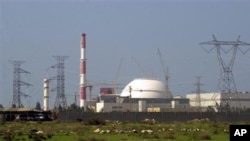The U.S. and its international partners continue to seek ways to demonstrate to Iran's leadership that its failure to engage in meaningful talks or to take meaningful steps to resolve international concerns with its nuclear program will have consequences.
Last month, the U.S. imposed sanctions on the Tidewater Middle East Company, a port operator firm owned by the Islamic Revolutionary Guard Corps, or IRGC, because it is linked to proliferation-related activities. Maersk Line, one of the world's largest container shipping firms, has announced in response it will suspend business with three Iranian ports.
The U.S. also imposed sanctions in June against Iran Air, which has provided material support to the IRGC and Iran's Ministry of Defense for facilitating Iran's proliferation-related activities. In addition, the U.S. announced new sanctions against ten shipping companies and three individuals with ties to Iran's state shipping line, which helps support Iran's nuclear and ballistic missile programs. These actions follow sanctions imposed by the EU at the end of May against more than 100 Iranian individuals and entities associated with Iran’s illicit conduct.
In a joint statement, Secretary of State Hillary Clinton and Treasury Secretary Timothy Geithner said, "Preventing Iran from developing nuclear weapons is a top U.S. Government priority, and we remain deeply concerned about Iran's nuclear intentions. The U.S. is committed to a dual-track policy of applying pressure in pursuit of constructive engagement and a negotiated solution."
But as Secretaries Clinton and Geithner noted, the U.S. has increased sanctions against Iran's security forces not only for their role in proliferation but also for their human rights abuses against the Iranian people. On June 9th, the U.S. sanctioned the IRGC, the Basij Resistance Force, and Iran' national police and its chief – all of which share responsibility for sustained and severe violations of human rights in Iran.
More recently, the Obama administration imposed sanctions on Iran's national police force, its chief and his deputy for supporting Iran's ally Syria in the "Syrian government's ongoing violence and repression of the Syrian people." Syrian security forces were also sanctioned for violence against peaceful Syrian protesters.
As State Department Deputy Spokesman Mark Toner noted in a press briefing, the sanctions send a message: "they send a message that we're watching these individuals' [and entities'] actions, and not only watching them, but we're taking action against them, to prohibit any involvement they may have in the U.S. economic system, which reaches worldwide."
The U.S. has increased sanctions against Iran's security forces not only for their role in proliferation but also for their human rights abuses against the Iranian people.




